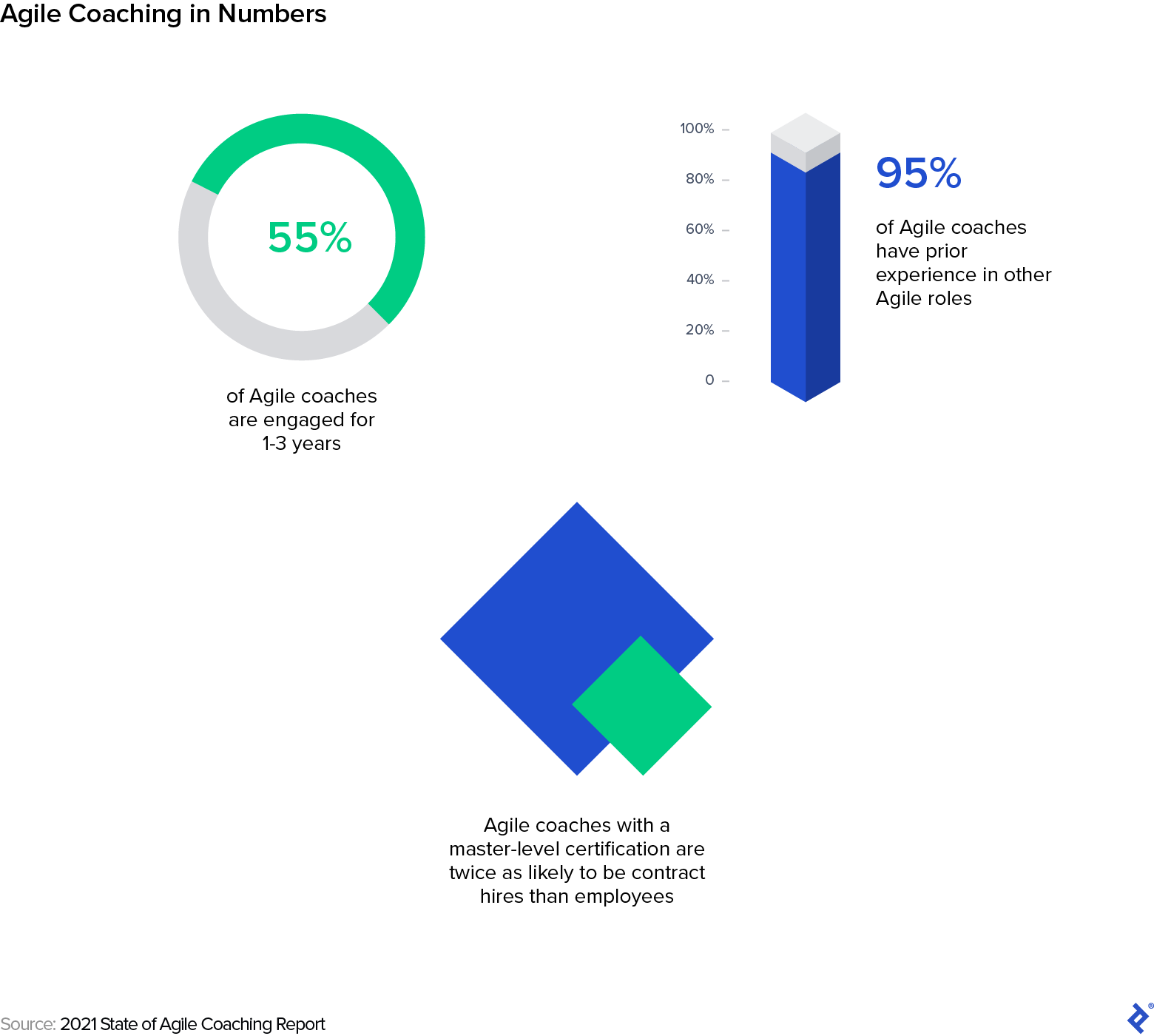Scrum Master vs. Agile Coach: Why Successful Transformations Need Both
During an Agile transformation, leaders often assume that the Agile coach role can be undertaken by a Scrum master. While they share similar traits, these roles have scopes that differ greatly.
During an Agile transformation, leaders often assume that the Agile coach role can be undertaken by a Scrum master. While they share similar traits, these roles have scopes that differ greatly.
Tony is a software engineer turned Agile professional who uses his development experience to guide organizations and teams to success.
Expertise
PREVIOUSLY AT

Agile transformations are difficult. They require huge shifts in the way people think, respond, and behave that are, by their nature, challenging. Unfortunately, many organizations underestimate the extent of these challenges, and their lack of preparation or inadequate resourcing can cause the transitions to be unsuccessful.
During an Agile transformation, it makes sense to have an experienced professional to help overcome the obstacles while providing guidance and support to teams, individuals, and leaders. That person is the Agile coach. There isn’t a single definition for an Agile coach, but the role is generally characterized by extensive Agile knowledge and experience, and responsibility for outlining and improving Agile processes within an organization. Coaches are on hand to help navigate any problems that may arise, ensuring the journey to organizational agility is as smooth as possible.
As well as being tasked with operational agility, however, Agile coaches are also often assumed to have responsibility for team performance. My position on this recently triggered an interesting debate with a hiring manager at a major insurance company. He asked me if I believed that a failing team indicates poor coaching. I answered maybe, but generally no. I reasoned that the Scrum master is responsible for team performance, while the coach is responsible for organizational effectiveness. To hold the coach solely responsible for team success is to disregard the Scrum master’s responsibility and, more significantly, to allow teams to escape accountability for their outcomes.
I believe that high-performing Agile coaches produce high-performing, agile Scrum masters who, in turn, produce high-performing Agile teams.
Scrum Adoption Takes Time and Practice
I focus on Scrum because it is the most commonly used Agile methodology. There is a well-known saying about Scrum: It is “easy to understand but difficult to master.” Volumes of research and decades of practical experience have gone into the underlying principles and application; these are summarized in the Scrum Guide, which defines the framework. The Scrum Guide does make Scrum easy to understand but reading a 14-page document does not automatically create a Scrum practitioner. Many aspects of Agile—such as being able to quickly adapt in complex, rapidly evolving scenarios—can only be mastered with time and experience. This way of working will go against deeply ingrained behaviors that cannot be unlearned overnight.
Expecting newly formed Agile teams to perform at a high level is akin to expecting an amateur tennis player to beat Roger Federer after a day’s training with a pro. This attempt to obtain expert results with minimal preparation is, however, the approach frequently undertaken by organizations transitioning to Agile, where teams are created, given basic training, and left to their own devices to bring agility to life. This is fraught with risk and may give the impression that Agile is a fad. Scrum requires people to think and behave in unfamiliar ways, which is a practical impossibility without support. It is a big mistake to simply teach the Scrum Guide and expect professional-level performance. This is where the Agile coach/Scrum master relationship comes in.
Roles and Responsibilities
The Agile Coach
The Agile coach function was created by industry professionals wanting to better prepare teams for success, but the role is not yet formally recognized by the Scrum Guide. It is for this reason, perhaps, that many organizations a) don’t view a coach as an essential factor in an Agile transformation or b) see it as interchangeable with the Scrum master role. While the two roles certainly share similar skill sets, the scope and expertise of an Agile coach is more extensive than that of a Scrum master. An Agile coach is essentially an experienced Scrum master with advanced training. The Agile coach works to increase overall agility and has a companywide view of progress, providing support for multiple teams, as well as at leadership level.
An effective Agile coach instills discipline of practice and drives continuous learning. The coach teaches servant leadership by example, understanding the distinction between mentoring, training, and facilitating, and knowing when each of these should be applied. Most importantly, coaches drive teams toward effective, creative solutions without spoon-feeding or fostering a dependency on the coach. This takes time, effort, wisdom, and patience, but the payoff is huge.
Day-to-day Agile coach responsibilities include:
- Communicating the Agile methodology and instilling best practices
- Training teams to navigate Agile tools and strategies
- Facilitating initial retrospectives and stand-ups
- Monitoring organizational progress and working to overcome any barriers
- Encouraging leadership and stakeholder buy-in
- Developing and maintaining standards
- Advising company leaders as they adjust to the Agile mindset
The Scrum Master
The Scrum master has many of the same responsibilities as the Agile coach. In fact, I believe that if an organization had enough sufficiently knowledgeable and experienced Scrum masters, the need for an Agile coach would be significantly reduced, as Scrum masters would be able to take on some of these responsibilities and act as a Scrum coach. In many cases, however, new Scrum masters tend to be transitioned project managers, so their experience is not always relevant to Scrum and they need Agile coaching.
The scope of Scrum masters is narrower than that of an Agile coach, and their focus is usually directed at a single team. As Scrum masters are embedded within teams, it is reasonable to expect them to have a clear sense of the team’s strengths and weaknesses, potential problems, and growth opportunities. An effective Scrum master is committed to using this knowledge to drive better outcomes by employing strategies and practices tailored to that team. The Scrum master guides their team to continuous improvement and is a source of empowerment. Team and individual growth opportunities will be missed if a Scrum master is not adequately focused on the team’s needs.
Day-to-day Scrum master responsibilities include:
- Teaching Scrum theory and practices
- Guiding individuals to improve their Agile knowledge and skills
- Leading positive, productive meetings and Agile ceremonies
- Facilitating effective communication among the team
- Assisting the team with sprint planning and backlog management
- Monitoring and improving the team’s outcomes
- Enabling the team to produce high-value increments and meet commitments

Agile Coach vs. Scrum Master
The strategy I advocate, whereby Agile coaches develop and empower strong Scrum masters, is a force multiplier consistent with Scrum values and Agile principles. I have regularly made the case that coaches serve best as consultants and not employees. The ideal Agile coach will work themselves out of a job at some point because they have been successful at leading Scrum masters to develop sufficient knowledge and skills. Ideally, after some time and positive traction, coaching can be done by a group of experienced Scrum masters as a Community of Practice. If a subsequent situation requires a coach, one can be engaged on an as-needed basis.
Here are some guidelines for implementing this approach, optimizing both roles, and helping bring teams to high performance:
- Agile coaches should supplement training, provide guidance, and foster Scrum master professional development
- Scrum masters should ensure they have access and authority to get things done for their teams and should focus on team-specific growth strategies
- Organizations should expect that Scrum masters will mature and develop Agile coaching skills and expertise
The Coach Should Foster Organizational and Team Maturity
Leaders do their organization a disservice when they expect Agile coaches to carry teams. Instead, the organization is much better served by empowered teams that eventually outgrow the need for intensive Agile coaching. If team members are afraid of what might happen when a coach leaves, there’s a problem. This means that the coach has allowed teams to depend too heavily on coaching, or the teams have leaned on the coach more than on their Scrum masters.
Where some organizations go wrong is in believing that the roles of Agile coach and Scrum master can be taken on by one person during an Agile transformation. But having different people occupy these roles, and recognizing the unique sphere and responsibilities of each, can strengthen an organization during the transition period and pave the way for sustainable agility.
Further Reading on the Toptal Blog:
- You’ve Landed Your Next Scrum Master Job. Now What?
- Tracking the Scrum Master Growth Path
- Agile Transformations: Why Leaders Resist and How to Bring Them on Board
- Agile, Scrum, and Kanban: What the Heck Do These Words Really Mean?
- What Is Agile? A Philosophy That Develops Through Practice
- Today’s Project Management Blueprint: A Comparison of Lean, Agile, Scrum, and Kanban
Understanding the basics
What is the difference between a Scrum master and an Agile coach?
An Agile coach is essentially an experienced Scrum master with advanced training and a higher level of expertise. Whereas a Scrum master focuses on and guides a single team, an Agile coach works to increase companywide agility.
Why do you need an Agile coach?
Organizations need Agile coaches to outline and improve Agile processes during a transformation and navigate any problems that arise. As well as guiding multiple teams toward Agile best practices, they also encourage leadership buy-in.
What makes a great Agile coach?
A coach needs to be able to switch between mentoring, training, and facilitating. They need to communicate the Agile methodology clearly and drive continuous learning without fostering dependency.
Tony Amos
Summit, NJ, United States
Member since January 1, 2021
About the author
Tony is a software engineer turned Agile professional who uses his development experience to guide organizations and teams to success.
Expertise
PREVIOUSLY AT


